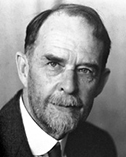Thomas Hunt Morgan revolutionized the field of genetics with his research on the chromosomal basis of heredity in Drosophila. He observed that genes were located in specific positions on chromosomes and that in certain cases genes can be inherited together or “linked.” Morgan found that many genes are sex-linked, meaning that some alleles are phenotypically expressed when related to an organism’s chromosomal sex. These discoveries led Morgan to deduce that a certain amount of crossing over must occur between linked genes and that the crossover frequency indicates the distance between genes on a chromosome. In 1933 he was awarded the Nobel Prize in Physiology or Medicine "for his discoveries concerning the role played by the chromosome in heredity."



